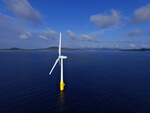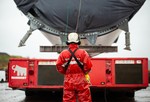News Release from WindEurope
Wind Industry Profile of
12/08/2011
Canada - Wind turbines do not erode human health, Canadian doctor announces
Wind energy do not erode human health, Canadian doctor announces. Proponents of wind power in Canada got a huge boost of confidence recently when Dr. W. David Colby, the acting medical officer of the Ontario municipality of Chatham-Kent, announced there is no scientific evidence of a link between wind farm sound exposure and health problems.
Colby, who is also an associate professor at the University of Western Ontario’s Schulich School of Medicine and Dentistry, said that the topic of wind farm noise has become complicated because of a huge misinformation campaign.
“Wind turbines do not produce unique sounds in terms of intensity or characteristics,” Colby said in an article published last week in IPPSO FACTO, a magazine of the Association of Power Producers of Ontario. “The sound intensity is virtually the same as what is found in normal urban environments.”
He said in the article that while wind farm opponents make claims about sickness caused by wind turbines, 10 reviews, including investigations by Ontario’s chief medical health officer, the Australian government, the Sierra Club and McMaster University, have confirmed there is no direct adverse health effects from wind turbines when sited to comply with Ontario’s noise regulations.
“Furthermore, all the power generation alternatives except solar energy are clearly worse than wind turbines in terms of health and environmental effects,” said Colby, who has collaborated on an international panel review on the topic with some of the biggest names in audiology and occupational health.
“That’s especially true of coal-fired generating stations. According to a study prepared for the Ontario government, coal plants cause nearly 250 deaths and more than 120,000 illnesses (such as asthma attacks) each year in the province.”
Colby said he was sympathetic to concerns raised by local residents and agrees wind power projects should be located to minimise impacts. He added, however, he has no concerns about wind power noise creating health problems.
“When it comes to energy choices for healthy communities, I am confident that we shouldn’t be tilting at wind turbines,” he wrote.
Colby’s comments came a week before the Canadian Wind Energy Association (CanWEA) announced that wind power in Canada will enjoy a record year in 2011 with approximately 1,400 MW of new installed wind farm capacity – compared to 690 MW installed last year.
Chris Rose, blog.ewea.org/
Colby, who is also an associate professor at the University of Western Ontario’s Schulich School of Medicine and Dentistry, said that the topic of wind farm noise has become complicated because of a huge misinformation campaign.
“Wind turbines do not produce unique sounds in terms of intensity or characteristics,” Colby said in an article published last week in IPPSO FACTO, a magazine of the Association of Power Producers of Ontario. “The sound intensity is virtually the same as what is found in normal urban environments.”
He said in the article that while wind farm opponents make claims about sickness caused by wind turbines, 10 reviews, including investigations by Ontario’s chief medical health officer, the Australian government, the Sierra Club and McMaster University, have confirmed there is no direct adverse health effects from wind turbines when sited to comply with Ontario’s noise regulations.
“Furthermore, all the power generation alternatives except solar energy are clearly worse than wind turbines in terms of health and environmental effects,” said Colby, who has collaborated on an international panel review on the topic with some of the biggest names in audiology and occupational health.
“That’s especially true of coal-fired generating stations. According to a study prepared for the Ontario government, coal plants cause nearly 250 deaths and more than 120,000 illnesses (such as asthma attacks) each year in the province.”
Colby said he was sympathetic to concerns raised by local residents and agrees wind power projects should be located to minimise impacts. He added, however, he has no concerns about wind power noise creating health problems.
“When it comes to energy choices for healthy communities, I am confident that we shouldn’t be tilting at wind turbines,” he wrote.
Colby’s comments came a week before the Canadian Wind Energy Association (CanWEA) announced that wind power in Canada will enjoy a record year in 2011 with approximately 1,400 MW of new installed wind farm capacity – compared to 690 MW installed last year.
Chris Rose, blog.ewea.org/
- Source:
- European Wind Energy Association
- Author:
- Posted by Trevor Sievert, Online Editorial Journalist / By Chris Rose, blog.ewea.org/
- Email:
- ewea@ewea.org
- Link:
- www.ewea.org/...
- Keywords:
- EWEA; wind, wind energy, wind turbine, rotorblade, awea, ewea, wind power, suppliers, manufacturerstrevor sievert



























